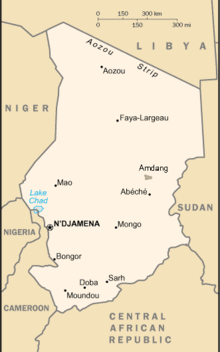Amdang language
| Amdang | |
|---|---|
| sìmí amdangtí | |
| Native to | Chad, Sudan |
| Region | Wadi Fira |
| Ethnicity | Amdang people |
Native speakers | 41,000 (2000)[1] |
|
Nilo-Saharan?
| |
| Language codes | |
| ISO 639-3 |
amj |
| Glottolog |
amda1238[2] |
|
Language map of Amdang (in grey) | |
Amdang (also Biltine; autonym: sìmí amdangtí) is a language closely related to Fur, which together constitute a branch of the Nilo-Saharan language family. It is mainly spoken in Chad, north of the town of Biltine, and sporadically elsewhere in Ouaddaï Region. There are also small colonies of speakers in Darfur near Woda'a and Fafa, and in Kordofan in the Abu Daza district and at Magrur north of Bara. Most of the ethnic group now speaks Arabic.
The language is also called Mimi, Mima or Biltine; the name "Mimi", however, is also applied to two extinct Maban languages of the area; Mimi of Nachtigal and Mimi of Decorse.
Bibliography
- Paul Doornbos & M. Lionel Bender. 1983. "Languages of Wadai-Darfur", in ed. M. Lionel Bender, Nilo-Saharan Language Studies, African Studies Center, Michigan State University
- Joseph Greenberg. 1972. "On the identity of Jungraithmayr's Mimi", Africana Marburgensia 5.2: 45-49. Mouton, The Hague.
- H. Jungraithmayr. 1971. "How many Mimi Languages are there?", Africana Marburgensia 4.2: 62-69.
- H. MacMichael. 1967 (1922). A History of the Arabs in the Sudan. Barnes and Noble, New York.
- H. Carbou. 1912. La Région du Tchad et du Ouadai. Leroux, Paris.
- M. Gaudefroy-Demombynes. 1907. Documents sur Les Langues de l'Oubangui–Chari, Actes du XIVe Congres des Orientalistes (Alger 1905). Paris.
References
- ↑ Amdang at Ethnologue (18th ed., 2015)
- ↑ Hammarström, Harald; Forkel, Robert; Haspelmath, Martin; Bank, Sebastian, eds. (2016). "Amdang". Glottolog 2.7. Jena: Max Planck Institute for the Science of Human History.
This article is issued from
Wikipedia.
The text is licensed under Creative Commons - Attribution - Sharealike.
Additional terms may apply for the media files.
